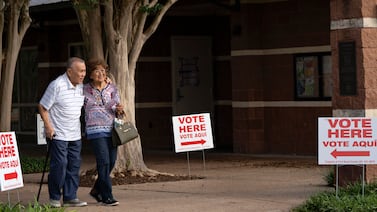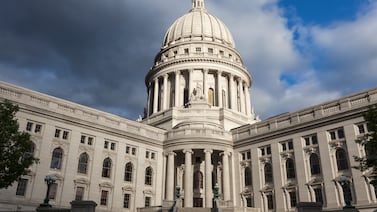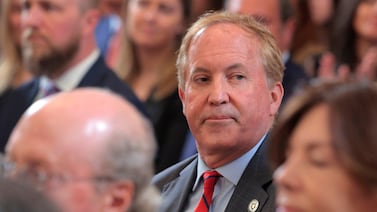Votebeat is a nonprofit news organization reporting on voting access and election administration across the U.S. Sign up for Votebeat Arizona’s free newsletter here.
Update, Feb. 18, 2025: Arizona Gov. Katie Hobbs vetoed HB2703, stating that, while she wants faster election results, “the solution should not needlessly restrict Arizona citizens’ freedom to vote, or undermine the learning and safety of students in public school districts.”
Update, Feb. 13, 2025: The Arizona House and Senate passed HB2703 on party-line votes, with Republicans in support. The bill would require Gov. Katie Hobbs’ signature to become law and Hobbs, a Democrat, has said she plans to veto it.
Republican lawmakers in Arizona pledged after the November election to find a way to speed up election results, but it appears unlikely this year that they’ll send Gov. Katie Hobbs a bill that she would actually sign.
The most likely alternative: Voters will see a related question on their ballot in 2026.
Republicans have been moving ahead on the conventional legislative route. The Arizona House voted Tuesday to advance a bill, HB2703, that would rein in one major cause of vote-counting delays: the ability of voters to drop off their mail ballot at polling places on Election Day. That’s how nearly 1 in 10 Arizona voters cast their ballots last November, which meant election officials had to spend days afterward checking voter signatures on hundreds of thousands of ballot envelopes before they could be counted.
The bill is likely to move to the Senate soon and the Senate president has introduced an identical bill, signaling this is likely to reach Hobbs’ desk soon.
But Hobbs, a Democrat, has repeatedly said that she won’t sign any legislation that she believes limits voting access, and she’s already said she would veto this one, seeing little hope for a compromise.
As a result, along with HB2703, House Republicans also advanced a ballot referral that closely mirrors the bill. If something similar also clears the Senate, it would show up as a question for voters on the November 2026 ballot.
The ballot question would serve as a test of how much Arizona voters are willing to give up for faster election results. The issue has become a political flashpoint in recent years, as Arizona has become a closely watched swing state that often leaves the nation waiting for results of high-profile races.
With tighter races in recent years, and prominent national contests that hinge on Arizona’s results, there’s been more pressure to count quickly. In some cases, the delays have come in races drawing national attention, such as the presidential election, congressional races, and the governor’s race.
Attempt at compromise fails
Last week, Hobbs’ office staff met with Republican lawmakers and GOP Chair Gina Swoboda to discuss potential compromises. After the meeting, Hobbs’ office sent Republicans a list reviewing the options they discussed. Hobbs would be willing to consider cutting off Election Day drop-offs, if Republicans considered adding some changes long sought by Democrats, such as allowing same-day voter registration and bringing back the Permanent Early Voting List, wrote Bo Dul, her general counsel.
Right now, the registration cutoff is 29 days before an election, and effective in 2027, voters must be cut from the early voting list if they don’t cast mail ballots in two subsequent election cycles.
But shortly before the House took up the bill Tuesday, Hobbs’ office issued a statement saying Republicans “refused to accept any common-sense compromises.” The GOP proposal, Hobbs spokesperson Christian Slater said, was not about speeding up election results, but “rather about disenfranchising voters to advantage one political party over the other.”
State Rep. Alex Kolodin, a Republican who attended the meeting with Hobbs’ staff and helped with the bill, said Hobbs had a “laundry list” of requests that Republicans weren’t willing to entertain.
Republicans, too, have added provisions to the bill that were nonstarters for Hobbs, including one that has the potential to cripple early voting in the state.
It would require voters to take an action to verify their address before elections in order to get a ballot in the mail. That would be a big change — Arizona has for nearly two decades automatically sent ballots out to any active voter on the early voting list.
Hobbs also opposes another portion of the bill that would require schools to serve as polling locations. The counties had requested this provision — along with in-person early voting the weekend before the election — to give voters more time and places to vote in person, if they could no longer drop off their mail ballots on Election Day.
That would force the schools to serve as polling locations even if “space is not available at the school or the safety or welfare of students is endangered,” Dul wrote.
Pressure has grown to get faster results
It’s normal for Maricopa County to take more than a week to finish counting votes, which is on par with or even faster than other Western states with a high percentage of mail voting.
Other states limit mail ballot drop-offs on Election Day to get results more quickly, but in Arizona, Democrats and voting rights groups have been opposed to that. They argued in recent committee hearings that such a change would be akin to voter suppression, because the option is so widely used.
Indeed, restricting drop-offs as the House bill proposes would mark a major cultural shift. About 85% of voters in the presidential election cast ballots early in person, by mail, or by dropping off a mail ballot in a drop box. About 8% of all voters who cast ballots — or about 265,000 — dropped off their mail ballot at a polling place on Election Day, according to data from the Secretary of State’s Office.
The GOP-backed ballot referral that the House advanced Tuesday “plain and simple will disenfranchise hundreds and thousands of voters,” Democratic state Rep. Oscar De Los Santos said during the House debate.
The bill doesn’t ban Election Day mail ballot drop-offs entirely — just at polling places. It would still allow drop-offs at county election offices. And county officials are interpreting it to allow for Election Day ballot drop boxes as well, which some counties currently operate. County officials are sometimes opposed to Republican measures, but this time, Republicans negotiated with the Arizona Association of Counties to gain the officials’ support.
Slater pointed out in a statement to Votebeat last week that those ballots will be processed more quickly in future elections even without the new proposal.
That’s because a bipartisan law enacted last year requires counties, starting in 2026, to provide an option for voters who drop off their mail ballot at a polling place on Election Day to show an ID there, which would eliminate the need to check their signature later.
“Instead of rushing through partisan political bills, Republicans should give that reform they themselves supported a chance to work,” Slater said.
Jen Fifield is a reporter for Votebeat based in Arizona. Contact Jen at jfifield@votebeat.org.





